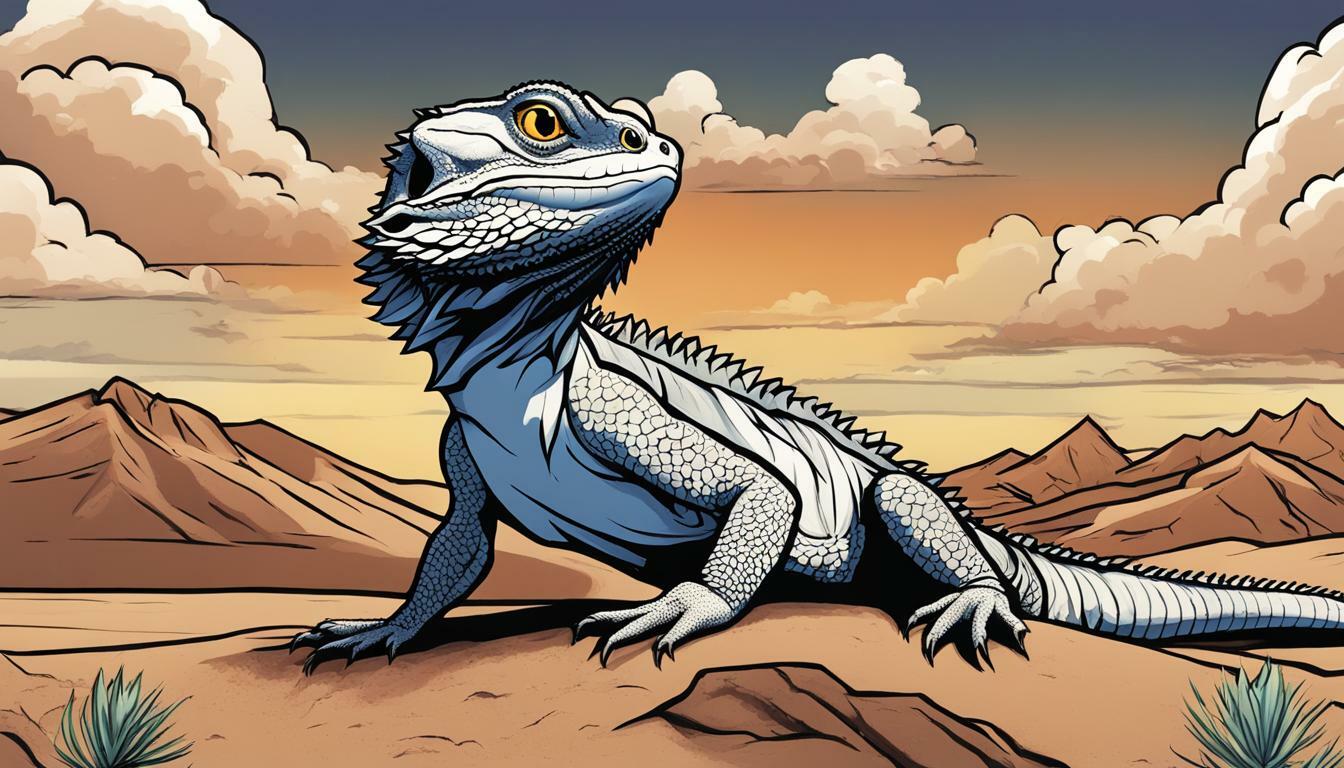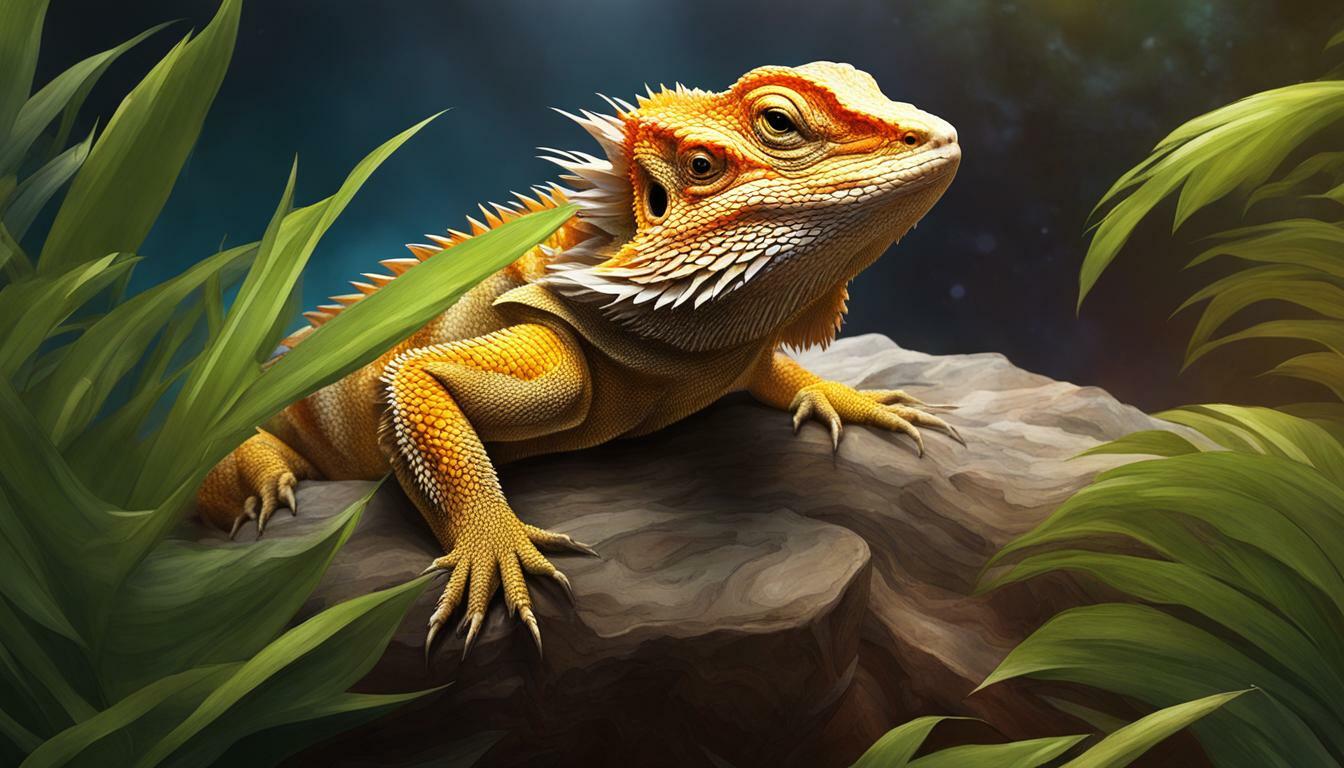If you’ve ever wondered if bearded dragons fart, you’re not alone. In this guide, we’ll explore the fascinating world of bearded dragon flatulence and uncover some interesting facts about your pet’s unique digestive system.
Key Takeaways:
- Bearded dragons do fart, usually during or after pooping.
- Farting is a natural and normal biological process caused by gas produced by bacteria in the digestive system.
- Factors that can contribute to farting in bearded dragons include a fiber-rich diet, swallowing air, and excessive bacterial buildup in the digestive tract.
- Farting is less common in healthy bearded dragons, but excessive or abnormal symptoms should be evaluated by a veterinarian.
- Preventing factors for farting in bearded dragons include proper hydration, regular bowel movements, and avoiding impaction.
Bearded Dragon’s Digestive System
To understand why bearded dragons fart, it’s essential to have a basic understanding of their digestive system and how it functions. Bearded dragons are omnivorous reptiles, meaning they consume both plant matter and small insects. Their digestive system is well adapted to process these varied food sources.
The journey of food through a bearded dragon’s digestive system begins when it enters their mouth. They have a unique ability to catch and swallow their prey whole, which can result in them inadvertently swallowing air as well. This can contribute to the production of gas in their digestive tract.
Once swallowed, the food travels down the esophagus and into the stomach. Here, powerful stomach acids break down the food into smaller particles. These particles then move into the small intestine, where nutrients are absorbed into the bloodstream.
The remaining undigested waste material passes into the large intestine, where water is reabsorbed, and more gas can potentially be produced. Finally, the waste material is eliminated through the cloaca, which serves as both the exit point for solid waste and the opening for reproductive and urinary systems.
The Digestive Process in Bearded Dragons
The digestive process in bearded dragons is complex and involves the action of enzymes, bacteria, and various organs. While gas production is a natural occurrence during digestion, excessive gas can indicate a problem. If a bearded dragon is experiencing discomfort, bloating, or other abnormal symptoms in addition to farting, it is recommended to seek veterinary care to rule out any potential health issues.
| Key Points | Summary |
|---|---|
| Bearded dragons are omnivorous reptiles. | They have a varied diet of both plants and insects. |
| Food is swallowed whole, potentially causing the ingestion of air. | This can contribute to gas production in the digestive system. |
| Food is broken down in the stomach and small intestine. | Nutrients are absorbed into the bloodstream. |
| Undigested waste material passes into the large intestine. | Water is reabsorbed, and gas can potentially be produced. |
| Excess gas or abnormal symptoms may require veterinary care. | It is important to monitor a bearded dragon’s overall health and well-being. |
Factors Contributing to Bearded Dragon Farting
Several factors can contribute to bearded dragons farting, including their diet, swallowing air, and the presence of excessive bacteria in their digestive tracts.
A fiber-rich diet plays a significant role in the production of gas in bearded dragons. These reptiles require a balanced diet comprising vegetables, fruits, and insects. The high fiber content in vegetables and fruits can lead to the production of gas during digestion. While fiber is an essential part of their diet, excessive consumption can result in increased farting.
Another factor that can contribute to bearded dragon farting is the swallowing of air. This can occur when they eat too quickly or when they exhibit certain behaviors, such as gulping their food. The swallowed air can accumulate in their digestive system and be expelled as gas. It is important to monitor their eating habits and ensure they eat at a moderate pace to minimize air intake.
Excessive bacterial buildup in the digestive tract is also a common cause of farting in bearded dragons. Bacteria naturally inhabit their gastrointestinal system and aid in the digestion and breakdown of food. However, an overgrowth of bacteria can lead to increased gas production. This can occur due to improper hygiene, unclean living conditions, or an imbalance in the gut microbiota. Regular cleaning of their habitat and ensuring proper hygiene can help prevent excessive bacterial buildup and reduce farting.
| Factors Contributing to Bearded Dragon Farting |
|---|
| A fiber-rich diet |
| Swallowing air |
| Excessive bacterial buildup in the digestive tract |
Is Bearded Dragon Farting Normal?
While farting is a natural and normal process for bearded dragons, it’s important to be aware of any signs that may indicate excessive gas or underlying health problems. The release of gas by bacteria in bearded dragons’ digestive systems is what causes them to fart. Factors such as a fiber-rich diet, swallowing air, and excessive bacterial buildup in the digestive tract can contribute to farting in these reptiles.
Healthy bearded dragons typically experience less farting, but if you notice that your pet is passing an excessive amount of gas or if the farting is accompanied by other abnormal symptoms, it is recommended to consult a veterinarian. These signs may include bloating, discomfort, changes in appetite or behavior, or unusual stool consistency.
Preventing excessive farting in bearded dragons involves ensuring their overall health and well-being. Some factors that can contribute to gas buildup in the digestive system include dehydration, constipation, and impaction. Providing your bearded dragon with a balanced, nutrient-rich diet and maintaining proper hydration can help keep their digestive system functioning optimally.
In conclusion, farting is a normal part of the digestive process in bearded dragons. It is important to be familiar with the signs of excessive farting or other abnormal symptoms that may indicate underlying health problems. By taking proactive measures to promote a healthy digestive system, you can help ensure your bearded dragon’s well-being and minimize any potential issues related to farting.
| Signs of Excessive Flatulence in Bearded Dragons | |
|---|---|
| Bloating | Discomfort |
| Changes in appetite or behavior | Unusual stool consistency |
When to Seek Veterinary Care
While occasional farting in bearded dragons is typically harmless, there are instances where veterinary care may be necessary to address excessive gas or related health issues. As a responsible owner, it’s important to be aware of the signs that may indicate a problem and seek professional help when needed.
If your bearded dragon is experiencing frequent or prolonged flatulence, it could be a sign of underlying digestive issues. Excessive gas may result from a variety of factors, such as a diet high in hard-to-digest fiber or the presence of an excessive amount of bacteria in the digestive tract. Additionally, if your dragon is exhibiting other symptoms like loss of appetite, bloating, diarrhea, or vomiting, it’s crucial to consult a veterinarian for a proper diagnosis and treatment plan.
When you visit the vet, they will likely perform a thorough examination of your bearded dragon, including a physical assessment, observation of behavior, and potentially some diagnostic tests. These tests may include blood work, fecal analysis, or imaging to determine the underlying cause of the excessive gas and address any related health issues.
Remember, prevention is key to maintaining your bearded dragon’s health. Ensuring they have a balanced and appropriate diet, providing proper hydration, and maintaining a clean and sanitary enclosure can help reduce the risk of digestive problems and excessive gas. Regular check-ups with a reptile veterinarian can also help identify any potential issues early on and establish a proactive care plan.
| Signs that may indicate the need for veterinary care: | Preventive measures to reduce the risk of digestive problems: |
|---|---|
|
|
Conclusion
Bearded dragons, like many animals, experience farting as a natural part of their digestive process, and while occasional flatulence is not a cause for concern, it’s important to monitor your pet’s overall health and seek veterinary attention if necessary.
Farting in bearded dragons occurs due to the release of gas produced by bacteria in their digestive system. Factors such as a fiber-rich diet, swallowing air, and excessive bacterial buildup in the digestive tract can contribute to farting. However, farting is less common in healthy bearded dragons.
If your bearded dragon’s farting is excessive or accompanied by other abnormal symptoms, it is recommended to consult a veterinarian. Excessive farting, dehydration, constipation, and impaction can be indicators of underlying health issues that require professional care.
In conclusion, farting is a normal part of digestion in bearded dragons and is not a cause for concern as long as it is not excessive or accompanied by other issues. By understanding the factors that contribute to farting and monitoring your pet’s overall health, you can ensure their well-being and enjoy the unique quirks of owning a bearded dragon.
FAQ
Do bearded dragons fart?
Yes, bearded dragons do fart. It is a natural and normal biological process.
When do bearded dragons fart?
Bearded dragons usually fart during or after pooping.
Why do bearded dragons fart?
Farting in bearded dragons occurs due to the release of gas produced by bacteria in their digestive system.
What factors contribute to bearded dragon farting?
Factors that can contribute to farting in bearded dragons include a fiber-rich diet, swallowing air, and excessive bacterial buildup in the digestive tract.
Is bearded dragon farting normal?
Yes, farting is a normal part of digestion in bearded dragons, but it should not be excessive or accompanied by other abnormal symptoms.
When should I seek veterinary care for my bearded dragon’s farting?
If your bearded dragon’s farting is excessive or accompanied by other abnormal symptoms, it is recommended to consult a veterinarian.





Leave a Reply